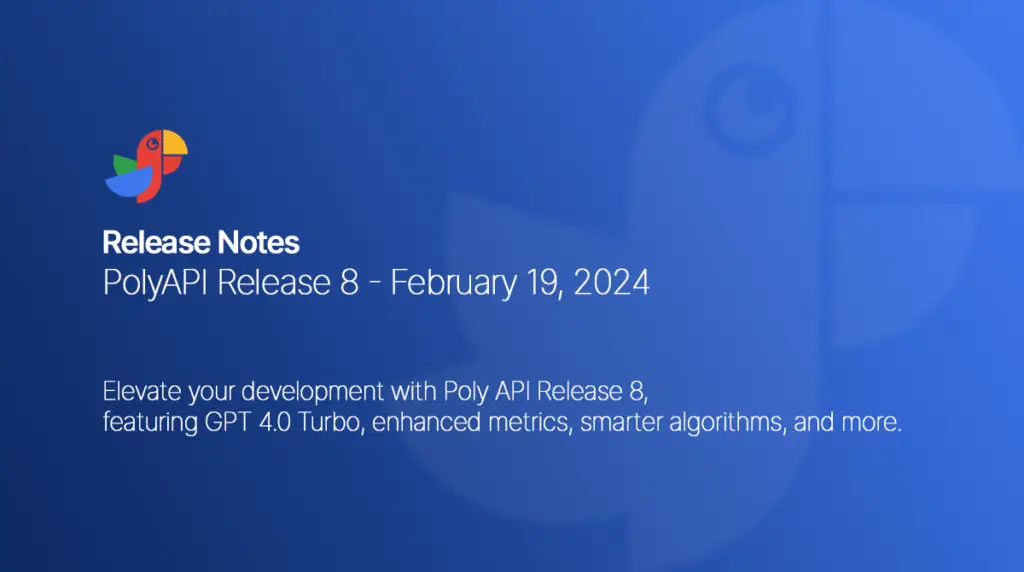PolyAPI continues its commitment to excellence with Release 8, bringing new features, performance enhancements, and crucial bug fixes. This release focuses on improving performance metrics, upgrading the AI Assistant, and enhancing client libraries for Python and Java. Let’s dive into the key updates.
New Features
Performance Metrics
We now capture performance metrics for each API function, server function, webhook, and trigger execution. By using the x-poly-execution-id response header value against the new /metrics endpoint, you can obtain request-specific metrics, allowing for detailed performance analysis.
AI Assistant
- GPT 4.0 Turbo: Upgraded the Poly AI Assistant to use GPT 4.0 Turbo, optimizing prompts to generate structures that more closely match how a Poly server function should be developed. This accelerates development and automated testing.
- Algorithm Improvement: Enhanced the search algorithm to increase the probability of finding functions in the catalog that were previously not selected due to verbose descriptions.
- User Intended Messages: Added a
for_user:trueflag, making it easier to filter user-intended messages in AI Agent conversations. - Webhook Event Handlers: Webhook event handlers can now include a
{ waitForResponse: true }argument, instructing the Poly server to wait for a response before releasing the connection with the HTTP client. - Response Content Type: You can now set the response content type for webhook handlers, server functions, and custom app responses using
polyCustom.responseContentType.
Python Client
Authorization Providers
Added support for authorization providers in Python clients, enhancing security and authentication capabilities.
Tree View
Python projects now have a rendered tree view, similar to TypeScript, making project navigation and management easier.
Variable Types
The types of variables are now available client-side, simplifying the use of variables.
Secrets Management
Removed the .get() operation on secrets, as secrets cannot be loaded locally by a client, ensuring better security practices.
Configuration
Added python -m polyapi config to change Poly URL and API Key configurations, simplifying client setup and management.
Descriptions
Included argument and function descriptions in the client library for better readability and usability.
Server Function Wakeup
Reduced server function wakeup time, improving performance and responsiveness.
CLI Outputs
Standardized all text outputs with TypeScript, ensuring consistency across clients.
Java Client
Tree View
Java projects now have a rendered tree view, similar to TypeScript, enhancing project navigation and management.
Library Scope
Added the ability to generate a subset of the library via POM configuration, providing more control over library generation.
Performance Optimization
Implemented optimizations for processing time when a Poly server function uses Poly API functions, improving overall efficiency.
Job Management
Added a mechanism to time out jobs that are running for too long, ensuring better resource management and preventing hang-ups.
Infrastructure
Redis Cache
Redis Cache is now deployed within the Poly Platform rather than as a cloud-specific service, enhancing performance and reliability.
Horizontal Scaling
Enabled horizontal scaling by default at deploy, ensuring better scalability and performance under varying loads.
Bug Fixes
- Fixed a bug preventing the patching of the
enabledRedirectproperty on API functions. - Resolved inconsistencies for the
executionTypeattribute between POST, GET, and PATCH functions on/jobs. - Blocked webhook creation with a context+name already taken by another webhook in the same environment.
- Corrected custom return types in custom functions to be correctly modeled with JSON Type Schema.
- Fixed an error where
errorHandlerdid not propagate the application ID correctly. - Resolved an issue where server functions that failed to deploy were incorrectly added as client functions.
- Fixed a bug preventing other MIME data types from being trained correctly in API functions.
Advancing API Management
Poly API Release 8 focuses on delivering enhanced performance, better developer tools, and robust bug fixes. These updates ensure that developers have the resources they need to build efficient, scalable, and secure applications with Poly API.
For more details, visit our documentation site or contact our support team. Your feedback is vital as we continue to innovate and improve Poly API.
